 Petzlover
PetzloverMiniature Schnauzer is originated from Germany but Nebolish Mastiff is originated from Canada. Both Miniature Schnauzer and Nebolish Mastiff are of same height. Miniature Schnauzer may weigh 190 kg / 418 pounds lesser than Nebolish Mastiff. Both Miniature Schnauzer and Nebolish Mastiff has almost same life span. Both Miniature Schnauzer and Nebolish Mastiff has almost same litter size. Miniature Schnauzer requires Moderate Maintenance. But Nebolish Mastiff requires Low Maintenance
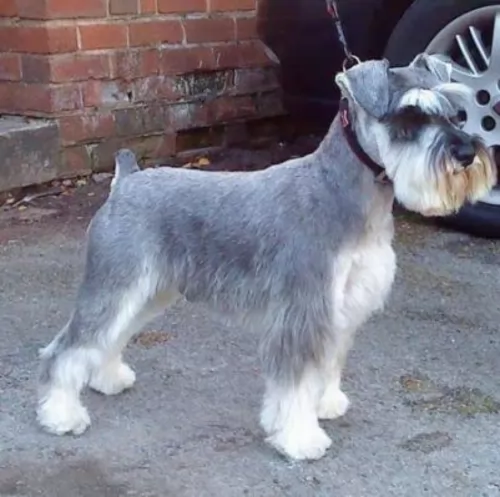 Miniature Schnauzers were first bred in Germany in the 19th century being bred from Affenpinschers and Standard Schnauzers.
Miniature Schnauzers were first bred in Germany in the 19th century being bred from Affenpinschers and Standard Schnauzers.
This dog was always used to control rats on farms, but these days he is more a companion. It is believed that the start of the modern Miniature Schnauzer in the United States was around 1924 when dogs were imported from Germany.
It was in 1933 that the Miniature Schnauzer was recognized by the AKC as a separate breed from the Standard Schnauzer.
With the Mastiff breeds, the rarest and the smallest is the Nebolish Mastiff. Bred to be more agile than the giant mastiffs, the Nebolish was developed in Canada. They were developed by crossing several breeds, such as the English Mastiff, Neapolitan Mastiff, Dogue de Bordeux, Bull Terrier, Bullmastiff, Boxer, St. Bernard, and Deutsche Dogge. Perhaps there was some Great Dane as well. It was also hoped that they would have better health than the rest of the Mastiff breeds.
There are also those who believe the Nebolish Mastiff is not a Canadian crossbreed but rather the re-creation of the giant dogs that lived with the soldiers of Alexander the Great. Still others believe the breed is still being developed and no standard is yet true. They believe the dog is a hybrid. No one knows the exact breeding lines today and not many are breeding the Nebolish today. Thus, the dog is extremely rare.
Only the American Breeder Association (ABA), the Canada Molosser Association (CMA) and the Dog Registry of America Inc. (DRA) recognize the Nebolish Mastiff as a separate breed.
These dogs are courageous, loyal and dignified like all Mastiffs. They are protective of their families or their flocks. They are loving, intelligent and even-tempered. They are known to be great with kids since they are patient and calm – easy to train.
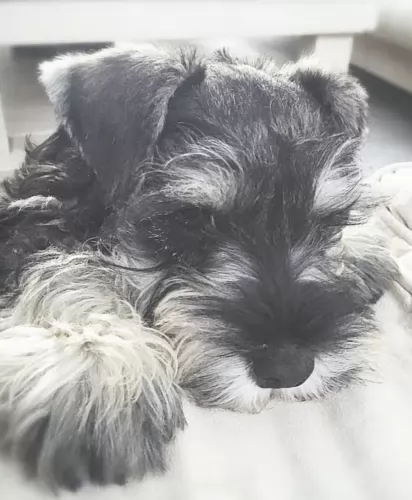 The Miniature Schnauzer is a small dog breed that stands between 30 to 36cm in height and weighs between 5 and 10kg.
The Miniature Schnauzer is a small dog breed that stands between 30 to 36cm in height and weighs between 5 and 10kg.
He has a sturdy body with a dense, wiry coat which most people prefer to have stripped. Because stripping is quite tedious, many of these dog owners prefer to have the coat clipped which actually gives the coat a greyish look to it.
The coat is usually a mix of black and silver. Some people refer to the Miniature Schnauzer as having a salt-and-pepper coat – hairs that are a mix of black and white. The dog has a double coat with the outer coat being wiry and the undercoat being a lot softer.
This is a dog that will need to be groomed frequently to prevent matting. A noticeable feature with these dogs is the rectangular shaped head with alert slanted eyes and bushy eyebrows, mustache and beard. In fact the word ‘Schnauzer’ means beard or muzzle.
The ears have been traditionally cropped but these days they are left and then they tend to be half-erect, half-floppy.
This is a tough little dog, fearless, cheeky, arrogant, alert and also friendly. A draw-card with him is that he is considered as a low-shedder and being hypoallergenic.
They’re very intelligent dogs too and will learn quickly when you give him training and socialization. This is important for a dog like this as he can quickly show you that he is strong willed and independent. Training and socialization makes him much nicer as he becomes more balanced and obedient.
He is full of life and extroverted and you can count on him to join you wherever you are and whatever you’re doing. Whether watching TV, swimming or hiking, he’ll be there and turn every occasion into a festive event. He is a loving, loyal dog, making a splendid pet.
He's protective of his human family and tends to be suspicious of strangers, and this is what makes him such a great watchdog.
The Nebolish Mastiff is very much like all other mastiffs with the exception of height and weight. He has a large head, long legs, strong neck, oval shaped paws, wide chest and large bones. He has solid muscles, large ears and a wide snout. They usually weigh anywhere between 43 and 82 kg. They tend not to slobber like the other mastiff breeds as a result of their breeding. They have a black mask and tail may or may not be docked.
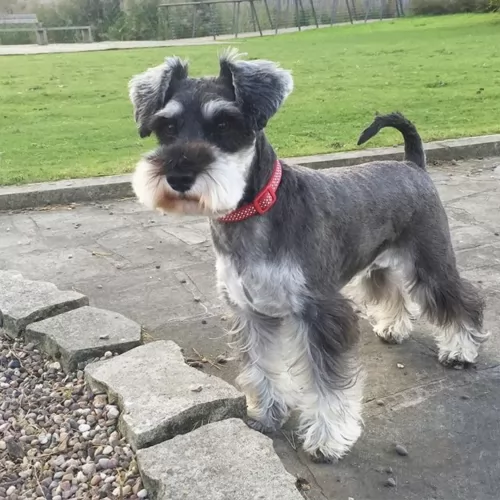 Miniature Schnauzers are such adaptable little dogs, quite happy to make a home with you in the city or in the countryside.
Miniature Schnauzers are such adaptable little dogs, quite happy to make a home with you in the city or in the countryside.
They’re sociable dogs, so just being with his human family wherever they are will suit him well. If he lives in the city however, he will need to have a walk everyday or taken to the park for a run.
He is also a dog that scarcely sheds, so he suits people battling with allergies. With an average life expectancy of 12 to 14 years, if you nurture your Mini Schnauzer and give him the best food and exercise there is, as well as loving him, you’re going to have a loyal and devoted pet.
Yes, they are very good with children.
Agility and swimming
No – they don’t do well with apartments and small spaces. They need a large fenced in yard.
High but can be stubborn
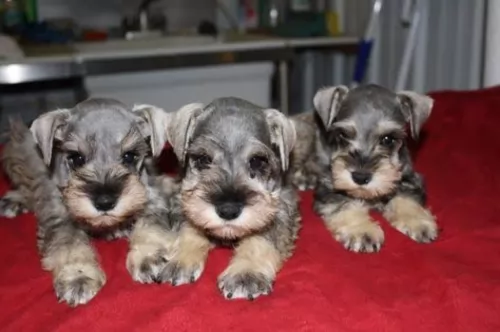 Your Miniature Schnauzer is pretty healthy and he isn’t likely to cost you much in terms of vet fees. There are however some common dog problems that you want to be aware of such as cataracts of the eye and hypothyroidism.
Your Miniature Schnauzer is pretty healthy and he isn’t likely to cost you much in terms of vet fees. There are however some common dog problems that you want to be aware of such as cataracts of the eye and hypothyroidism.
This a a problem in the lens of the eye. The lens should be clear, and when a dog has a cataract, it obscures the vision. The size of the cataract can lead to blindness.
Diabetes in a dog can bring on cataracts as can genetics or damage to the eye from exposure to ultraviolet light. Fortunately, dogs with cataracts can still see. Dogs with old cataracts can have surgery to remove them.
When a dog owner suspects a cataract in their pet’s eye it is best to treat it immediately with anti-inflammatory dog cataract eye drops. Cataracts never go away however without surgery.
The thyroid gland in the neck produces a hormone called thyroxine. It controls metabolism, but with hypothyroidism, enough of the hormone isn’t made. Its a common disease which affects all dog breeds.
Signs of hypothyroidism include hair loss, weight gain, intolerance to cold and a troublesome skin. To have the disease diagnosed, the vet will do a series of blood tests.
Bred to be much healthier than other mastiff breeds, the Nebolish has very few health concerns. They live twice as long as most other Mastiff and giant breeds at up to 14 years. The most often reported health issue is:
bloat – where the intestines and stomach organs are twisted or distended. Bloat can be deadly so don’t hesitate on treatment. Avoid it by not overfeeding after or before exercise.
Test for Hip dysplasia as it can cause lameness or arthritis.
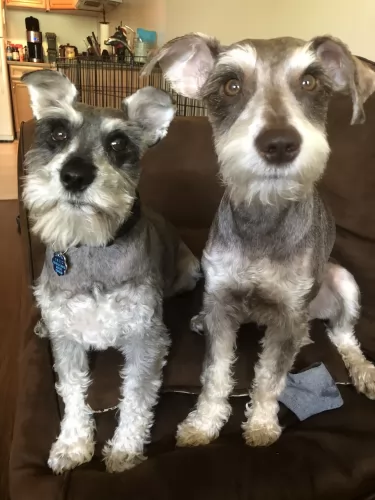 Let’s look at several ways you need to care for your Miniature Schnauzer -
Let’s look at several ways you need to care for your Miniature Schnauzer -
Make sure you have his puppy injections on time. This means knowing which veterinarian you’ll use. Later on if you don’t want to go in for breeding, you will need to have your pet spayed or neutered.
Make sure you have a nice warm, dry spot for your dog to sleep. It can be a cardboard box, or you can buy a dog basket or sleeping platform. Make sure your pet loves it and knows he can retreat to it anytime he wants.
If he goes outside for a few hours, make sure that he has a place to lie in the shade and away from the elements.
Good food promotes good health and longevity. You can feed your pet one of the top quality commercially manufactured foods and give your pet some variety by adding in some boiled chicken, vegetables and brown rice. Some raw meat occasionally can also be excellent for your pet.
Don’t overfeed and don’t feed too much protein in the first year. Feed 1-2 cups in two meals.
bloat – Tendency to become obese so don’t over feed. About 2-3 cups in 2 meals per day.
agility and flexibility
This intelligent breed actually enjoys training, toys and all kinds of mentally stimulating puzzles. They love water and are very good swimmers. They need an average amount of exercise - a couple walks per day. Need a large fenced yard. They make great therapy dogs and play catch.